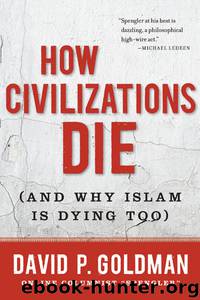How Civilizations Die by David Goldman

Author:David Goldman
Language: eng
Format: epub
Publisher: Regnery Publishing
Published: 2011-08-27T04:00:00+00:00
The Theology of Submission versus the Theology of Love
We cannot understand societies driven by a religious impulse without considering their religion as such. In this regard theology is the elder sister of political philosophy. But theology is helpless if it offers nothing better than a catalogue of ritual and belief. Theology must instead look at ritual and belief through the eyes of the committed believer. Our knowledge of the Transcendent is existential, not objective. There is never a “reasonable” ground for martyrdom, let alone suicide (except perhaps at the point of capture by the Gestapo). Yet Christians and Jews have offered their lives rather than apostatize. To make sense of what a religion teaches and what the faithful actually believe, we must understand its theology both objectively—as a statement about God and the world—and also existentially, that is, as the members of the religion live it in ordinary life.
In chapter 6 we reviewed Islam’s deep roots in tribal society. Unlike Judaism and Christianity, in which every individual participates directly in the covenant with God, Islam retains the hierarchy of pre-biblical traditional society, in which the head of a family is a miniature head of state. If the Muslim womb is closing because of a failure of faith, we must look more deeply at the faith that has failed in its encounter with modernity.
Judaism and its daughter-religion Christianity sought to distinguish themselves from paganism. But what does “paganism” actually mean? In Franz Rosenzweig’s sociology of religion, the animal ties of common ancestry define the pagan order. Individuality in the Judeo-Christian sense is inconceivable, for every member of society must bear the same identity of blood and soil as every other member, and the single member of society can be nothing other than an expression of collective blood and collective will. For this reason every institution of pagan society, emphatically including family and clan, must collapse into the totality. Here is how Rosenzweig described the absence of individuality in pre-modern society:
In the thoroughly organized State, the State and the individual do not stand in the relation of a whole to a part. Instead, the state is the All, from which the power flows through the limbs of the individual. Everyone has his determined place, and, to the extent that he fulfills it, belongs to the All of the State. . . . The individual of antiquity does not lose himself in society in order to find himself, but rather in order to construct it; he himself disappears. The well-known difference between the ancient and all modern concepts of democracy rightly arise from this. It is clear from this why antiquity never developed the concept of representative democracy. Only a body can have organs; a building has only parts.5
As we have seen, the family is a miniature clan, the clan is a miniature tribe, and the tribe is a miniature nation. All the layers of society stand in relation to each other like nested Russian dolls, identical except for their size.
Ancient Israel, and later Christianity, constituted an alternative to pagan social order.
Download
This site does not store any files on its server. We only index and link to content provided by other sites. Please contact the content providers to delete copyright contents if any and email us, we'll remove relevant links or contents immediately.
| Anthropology | Archaeology |
| Philosophy | Politics & Government |
| Social Sciences | Sociology |
| Women's Studies |
The Secret History by Donna Tartt(19088)
The Social Justice Warrior Handbook by Lisa De Pasquale(12190)
Thirteen Reasons Why by Jay Asher(8910)
This Is How You Lose Her by Junot Diaz(6887)
Weapons of Math Destruction by Cathy O'Neil(6280)
Zero to One by Peter Thiel(5802)
Beartown by Fredrik Backman(5754)
The Myth of the Strong Leader by Archie Brown(5507)
The Fire Next Time by James Baldwin(5446)
How Democracies Die by Steven Levitsky & Daniel Ziblatt(5219)
Promise Me, Dad by Joe Biden(5153)
Stone's Rules by Roger Stone(5088)
A Higher Loyalty: Truth, Lies, and Leadership by James Comey(4964)
100 Deadly Skills by Clint Emerson(4925)
Rise and Kill First by Ronen Bergman(4789)
Secrecy World by Jake Bernstein(4753)
The David Icke Guide to the Global Conspiracy (and how to end it) by David Icke(4720)
The Farm by Tom Rob Smith(4513)
The Doomsday Machine by Daniel Ellsberg(4490)
